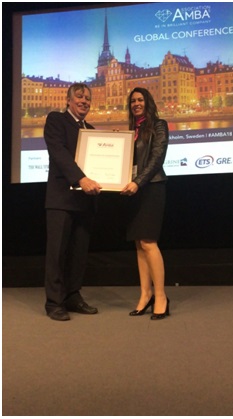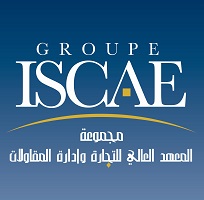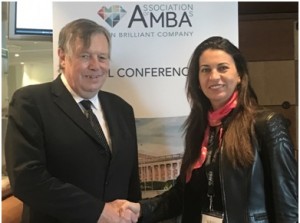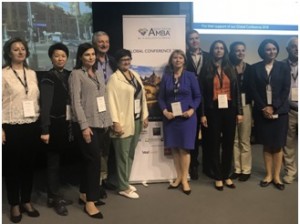
Du 14 au 16 Mai 2018, la Directrice Générale du Groupe ISCAE, Mme Nada BIAZ, a pris part à “AMBA Global Conference 2018” qui s’est tenue à Stockholm.
L’objectif de cette conférence est de réunir d’éminentes personnalités de l’enseignement supérieur en gestion (Doyens, Directeurs de programmes MBA,etc.) et des managers de par le monde pour partager et échanger sur les points suivants : l’attractivité des programmes MBA, l’Innovation et la digitalisation, la globalisation et les résultats de la dernière étudesur le marché MBA.
Voici un résumé de l’événement en anglais, tel que reporté par Mme Nada BIAZ :
“The AMBA global conference 2018, organized in Stockholm, gathered about 200delegates and 35 speakers from Business Schools’ decision makers to business world professionals.
The conference was an opportunity to have the global MBA market overview, to discuss the global and specific challenges that BS face in a volatile environment, as well as to network with world-class Business Schools. It was also a great opportunity to stretch the network to other stakeholders including service providers, such as support to institutions in maintaining AMBA accreditation, online lectures and case studies by leading experts, digital solutions for business education institutions, global business education assessment services, global market intelligence data, application assessment and admission solutions…
The conference offered also the opportunity to get the latest information about AMBA activity update and future strategy.
Founded in 1967 as the BGA (Business Graduates Associations) by 8 Ivy Leagues MBA graduates, AMBA counts today 259 accredited Business Schools over 70 countries, 12 of them in Africa. Only 2% of the world’s Business Schools are AMBA accredited. About 34000 AMBA students and graduate members (2869 only from Africa) in more than 150 countries can take advantage of the complementary services offered to the community.
Actually, AMBA is the world’s only association specifically accrediting MBA programs, with the ambition of promoting quality MBA Education, lifelong learning and offering services for students before, during and after an MBA program. Through regular market research, AMBA is offering data to Business Schools about significant trends (ex: 35% female and 63% men in MBA programs on a global scale, 27% are domestic and 73% are international students).
The Future strategy of AMBA is not to stretch the brand, but keep it specific to MBAs with very high standards. Africa seems to be a continent that is getting a great deal of attention and AMBA will be a sponsor at the 2018 AABS Conference in Dar Essalam. This is a clear message on the role that African, and local Business Schools in general, have to play along with world-class BS, to have a positive local and global impact. Actually, one of the major topics that caught my attention was about “Developing MBA programs in emerging markets”.
The specificity of MBA programs in emerging markets
In emerging markets, the issue is to think not only about growth but inclusive growth, not only about global but also local impact in the region, to define a mission that differentiates the BS from other BS around the world, built on the specific needs of the emerging market.
Actually, the BS should position itself as a local BS with field experience, local networking opportunities but also with high international standards. It should also be looking for sustainability and resilience in a volatile environment.
A constraint/ challenge that seems to be common for most emerging countries BS are administrative and financial regulations.
Actually, there is a paradox: From the one hand, international accreditations are a keystone in the model for development for those Business Schools. From the other hand, regulations keep emerging markets Business Schools from starting the international accreditation process, due to rigid regulations, lack of autonomy and absence of national incentive schemes for research development and innovation in particular.
Regarding the other topics discussed, there was about 20 sessions mainly focusing in 4 ground-breaking ideas, all of them equally interesting:
-MBA job market expectations: agility and “Lego players”
-Students’ expectations from an MBA: relevance and flexibility, tailor-made MBAs and lifelong learning
-Technology and lifelong learning through virtual education and blended learning
-Impact and responsibility
I will definitely not go through all my notes because these are subjects that have been discussed many times. But what really impressed me is the way it was presented.
In fact, the topics I would like to share with you are the ones who had an emotional impact on me, making me feel as curious as a kid in a toy store, surrounded by LEGOs, Science Fiction and soft Catch boxes.
Actually, most of all, I experienced the great effect of metaphors on remembering ideas and messages.
Welcome to LEGO LAND
A paradox approach is not theory, it’s first of all a question of mind-set and practice. The great LEGO player is the one who can do the most innovative and unexpected creation of his one, with whatever pieces he got in his possession.
Even more, the managers we have to educate in our MBA programs should be able to thrive through paradox and tensions. We should keep in mind the higher purpose of the BS: Inspire and develop the builder of tomorrow.
The LEGO manager puts pieces together in a creative way to create an exclusive combination that keeps pieces together, through dynamic balancing between paradox positions that might be creating tensions.
The first question is: Where are the tensions coming from?
The answer is that change, scarcity, uncertainty leads to tensions, pervasive tensions:
Short Term Vs LT
Financial Vs Social
Global Vs Local
Core Vs Explore
Centralized vs Decentralized
Competition Vs Cooperation
Flexibility Vs Stability
Internal Vs External
Individual Vs Team
Authority Vs Democracy
Confidence Vs Humility.
The second question is: How do we teach are students to navigate through those tensions? Knowing that:
The problem isn’t the problem, the problem is the way we see the problem
The paradoxes are contradictory and Interdependent
The problems of tension are persistent.
The challenge for Business Schools, especially through MBA programs that are supposed to educate innovative, agile and entrepreneurial manager, is to teach “Paradoxal Leadership”, recognizing the personal preferences, anxiety, efforts and the interaction between Emotion/ Cognition. Looking for the best blend of tradition-disruption, theory-practice, individuality-teamwork, placement-lifelong learning is not an easy task. It is not easy neither to learn nor teach how to Separate and Connect: Separate (structures, roles, metrics, time and agendas) and Connect (vision, metaphor, improvisation frameworks, open innovation, teamwork, global networks).
Yet, a paradox approach is a great opportunity for creativity. Picasso, Mozart works of art are full of paradox.
There are exciting perspectives and excitement for the future for MBA graduates: For MBA Graduates, sky is the limit!
So “don’t avoid paradox, explore paradox and engage in paradox”.
The first paradox to engage in is the paradox of knowledge, which is a great expression of humility: the more you know, the more you know you don’t know.
However, as millennials and Generation K are arriving to MBA programs, they should be convinced that through their Lego pieces of art, creating shared value has never been more rewarding.
The virtual professor: enabling world class teaching or Star Wars science fiction?
If it’s now possible to bring world class cohorts into the classroom through virtual classes, how can we bring world class faculty in the same classroom? During the second day of this amazing AMBA 2018 Global Conference, we had an answer through holographic telepresence applications for education. You can be a school in a remote part of the world and bring the best faculty. You can bring a face to face experience to any school through technology using 3D and holograms. We had the privilege to witness the impressive effect of such incredible technology, in real time. The attendees were not only able to see and listen to the remote guest speaker (from Canada) but to interact through a Q & A session.
On another note, a less sophisticated and more affordable innovative idea that I would like to share is the “Catch Box Microphone” (look it up on Internet). It is a great sponge cube hosting the microphone, which you can throw during Q & A sessions. It looks like a baby toy, very soft so it won’t hurt when thrown. The message I got from its friendly use is: You engage in the game when you throw the ball to get a question; and you accept the ball when you are ready to answer. What a great way to learn through interaction.”






